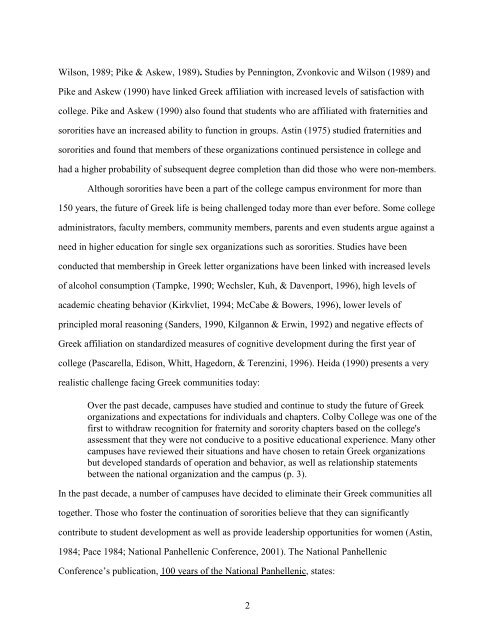Sorority Rituals - Reflections On Rites of ... - Mari Ann Callais
Sorority Rituals - Reflections On Rites of ... - Mari Ann Callais
Sorority Rituals - Reflections On Rites of ... - Mari Ann Callais
You also want an ePaper? Increase the reach of your titles
YUMPU automatically turns print PDFs into web optimized ePapers that Google loves.
Wilson, 1989; Pike & Askew, 1989). Studies by Pennington, Zvonkovic and Wilson (1989) and<br />
Pike and Askew (1990) have linked Greek affiliation with increased levels <strong>of</strong> satisfaction with<br />
college. Pike and Askew (1990) also found that students who are affiliated with fraternities and<br />
sororities have an increased ability to function in groups. Astin (1975) studied fraternities and<br />
sororities and found that members <strong>of</strong> these organizations continued persistence in college and<br />
had a higher probability <strong>of</strong> subsequent degree completion than did those who were non-members.<br />
Although sororities have been a part <strong>of</strong> the college campus environment for more than<br />
150 years, the future <strong>of</strong> Greek life is being challenged today more than ever before. Some college<br />
administrators, faculty members, community members, parents and even students argue against a<br />
need in higher education for single sex organizations such as sororities. Studies have been<br />
conducted that membership in Greek letter organizations have been linked with increased levels<br />
<strong>of</strong> alcohol consumption (Tampke, 1990; Wechsler, Kuh, & Davenport, 1996), high levels <strong>of</strong><br />
academic cheating behavior (Kirkvliet, 1994; McCabe & Bowers, 1996), lower levels <strong>of</strong><br />
principled moral reasoning (Sanders, 1990, Kilgannon & Erwin, 1992) and negative effects <strong>of</strong><br />
Greek affiliation on standardized measures <strong>of</strong> cognitive development during the first year <strong>of</strong><br />
college (Pascarella, Edison, Whitt, Hagedorn, & Terenzini, 1996). Heida (1990) presents a very<br />
realistic challenge facing Greek communities today:<br />
Over the past decade, campuses have studied and continue to study the future <strong>of</strong> Greek<br />
organizations and expectations for individuals and chapters. Colby College was one <strong>of</strong> the<br />
first to withdraw recognition for fraternity and sorority chapters based on the college's<br />
assessment that they were not conducive to a positive educational experience. Many other<br />
campuses have reviewed their situations and have chosen to retain Greek organizations<br />
but developed standards <strong>of</strong> operation and behavior, as well as relationship statements<br />
between the national organization and the campus (p. 3).<br />
In the past decade, a number <strong>of</strong> campuses have decided to eliminate their Greek communities all<br />
together. Those who foster the continuation <strong>of</strong> sororities believe that they can significantly<br />
contribute to student development as well as provide leadership opportunities for women (Astin,<br />
1984; Pace 1984; National Panhellenic Conference, 2001). The National Panhellenic<br />
Conference’s publication, 100 years <strong>of</strong> the National Panhellenic, states:<br />
2



